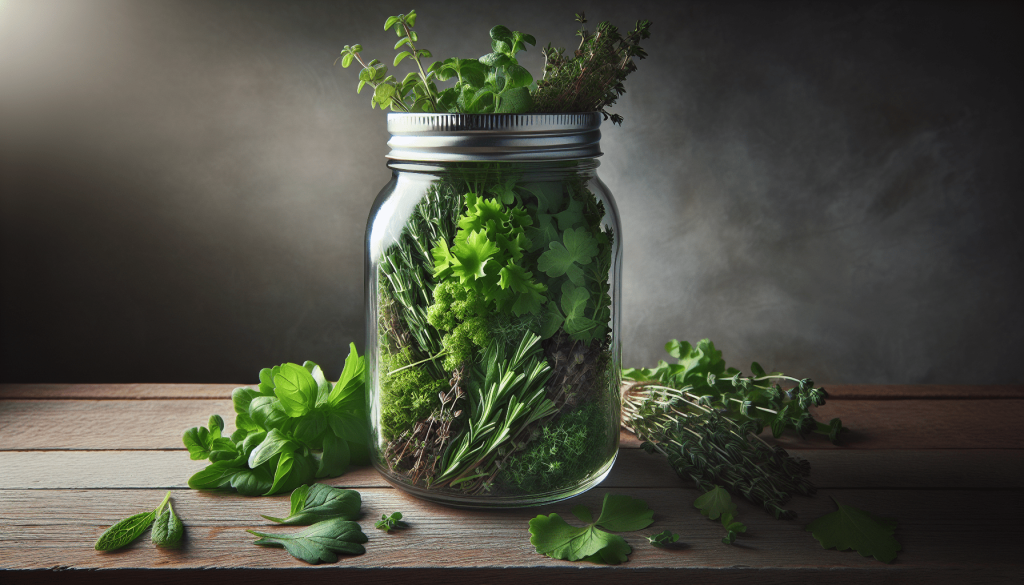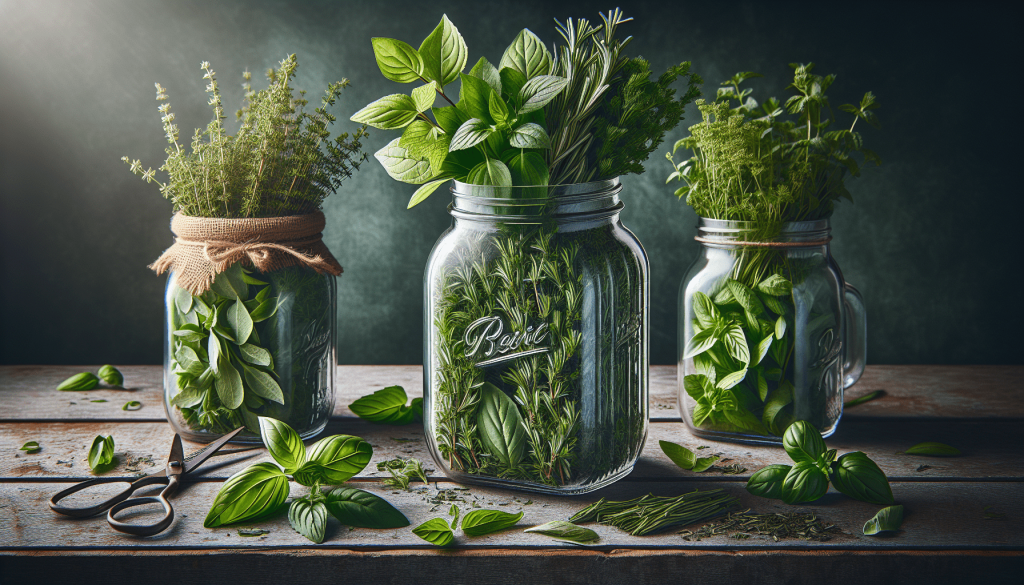Are you tired of your fresh herbs wilting away before you get a chance to use them? Fear not, because we have the best ways to preserve those precious herbs for later use. From freezing to drying, we will explore various techniques that will ensure the tantalizing flavors of your herbs are retained for future culinary adventures. So, whether it’s a sprig of rosemary or a handful of basil, read on to discover how you can make your herbs last longer and add a burst of freshness to your dishes all year round.

Drying Herbs
Air Drying
Air drying is one of the easiest and most traditional methods to dry herbs. It is a simple process that allows you to preserve the flavor and aroma of your herbs. To air dry herbs, start by bundling them together using string or twine and hanging them upside down in a dry and well-ventilated area. This method works best with herbs that have low moisture content, such as rosemary, thyme, and oregano. Ensure that the herbs are fully dry before storing them in an airtight container to maintain their quality.
Drying in the Oven
If you’re looking for a quicker way to dry your herbs, using the oven is a great option. Start by preheating your oven to a low temperature, around 180°F (82°C). Spread the herbs out on a baking sheet, making sure they are in a single layer to ensure even drying. Place the sheet in the oven and let the herbs dry for about 2-4 hours. Keep an eye on them to avoid over-drying. Once dried, remove from the oven, allow them to cool completely, and store in an airtight container.
Using a Dehydrator
Using a dehydrator is another efficient method for drying herbs. Dehydrators provide a controlled environment that ensures even drying and preserves the flavor and aroma of the herbs. Simply spread the herbs on the dehydrator trays, making sure they aren’t overlapping. Set the dehydrator to the appropriate temperature for herbs, typically around 95°F (35°C) to 115°F (46°C), and let them dry for several hours. Once dry, transfer them to an airtight container for storage.
Freezing Herbs
Flash Freezing
Flash freezing is a popular method for preserving herbs, as it allows you to retain their vibrant color and fresh flavor. To flash freeze herbs, start by washing and thoroughly drying them. Remove any tough stems or damaged leaves. Place the herbs on a baking sheet in a single layer, ensuring they are not touching each other. Put the sheet in the freezer and let the herbs freeze for a couple of hours. Once frozen, transfer them to a resealable freezer bag or container and store them in the freezer for future use.
Herb Cubes
Herb cubes are a convenient way to have herbs readily available for cooking. They are incredibly easy to make! Start by chopping your herbs into small pieces and placing them into ice cube trays. Fill the trays with either water or olive oil, depending on your preference, and freeze them. Once frozen, remove the herb cubes from the trays and transfer them to a freezer bag, labeling them with the herb type. Whenever you need herbs for your dishes, simply add a cube or two to your recipe, allowing them to thaw and infuse their flavors.
Herb Oil
Preserving herbs in oil is an excellent method for adding a burst of flavor to your dishes. To make herb-infused oil, start by washing and thoroughly drying your herbs. Next, remove the leaves from the stems and place them into a jar or bottle. Pour olive oil or another neutral oil of your choice over the herbs, ensuring they are fully submerged. Seal the jar tightly and let it sit in a cool, dark place for a few weeks to allow the flavors to infuse. Strain the oil into a clean bottle or jar, removing the herbs, and store in a cool place away from direct sunlight.
Frozen Herb Butter
If you love the combination of herbs and butter, freezing herb butter is a fantastic way to preserve their flavors. Start by combining softened butter with finely chopped herbs in a bowl. Mix until well combined. Roll the herb butter into a log shape using plastic wrap, ensuring it is tightly wrapped. Place the herb butter log in the freezer and let it freeze completely. Whenever you need herb-infused butter for cooking, simply slice off a portion from the log and return the rest to the freezer for later use.
Preserving Herbs in Oil
Infused Herb Oil
Infused herb oil is not only a great way to preserve herbs but also a versatile addition to your culinary creations. To make infused herb oil, start by washing and drying your chosen herbs thoroughly. Crush or bruise the herbs slightly to release their essential oils. Place the herbs in a sterilized jar and pour oil over them until fully submerged. Seal the jar tightly and let it sit in a cool, dark place for a few weeks. Shake the jar occasionally to help with the infusion process. After the desired infusion time, strain the oil into a clean bottle or jar, removing the herbs, and store it in a cool place.
Herb-Infused Vinegar
Herb-infused vinegar is another way to preserve the flavors and aromas of your favorite herbs. Start by washing and drying the herbs thoroughly. Crush or bruise them slightly to enhance the infusion process. Place the herbs in a sterilized jar and pour vinegar over them, ensuring they are fully covered. Seal the jar tightly and let it sit in a cool, dark place for several weeks. Shake the jar occasionally to aid in the infusion process. Once the desired infusion time has passed, strain the vinegar into a clean bottle or jar, discarding the herbs, and store it in a cool place.
Herb-Flavored Salt
Preserving herbs in salt not only extends their shelf life but also creates a flavorful seasoning. To make herb-flavored salt, start by washing and drying the herbs thoroughly. Remove any tough stems or damaged leaves. Chop the herbs finely or blend them in a food processor. Mix the herbs with an equal amount of salt until well combined. Spread the mixture on a baking sheet and let it air dry for a few days until the herbs are completely dry. Once dry, store the herb-flavored salt in an airtight container to keep it from clumping and maintain its freshness.
Making Herb Paste
Blending with Oil
Creating a herb paste is a convenient way to have concentrated herb flavors readily available. To make herb paste, start by washing and thoroughly drying the herbs. Remove any tough stems or damaged leaves. Place the herbs in a food processor and pulse until finely chopped. Add oil, such as olive oil or another neutral oil of your choice, gradually while pulsing the herbs. Continue blending until a smooth paste consistency is achieved. Transfer the herb paste to a jar and store it in the refrigerator. The herb paste will last for several weeks and can be used to enhance the flavors of various dishes.
Using a Food Processor
If you don’t have oil on hand or prefer a simpler method, using a food processor to create herb paste is a great alternative. Begin by washing and drying your herbs thoroughly. Remove any tough stems or damaged leaves. Place the herbs in a food processor and pulse until finely chopped. You can also add a small amount of salt to help extract moisture and enhance preservation. Once the herbs are finely chopped, transfer the paste to a jar or an ice cube tray, cover tightly or wrap in plastic wrap, and store in the refrigerator or freezer, depending on your preference.

Creating Herb-infused Alcohol
Herb-Infused Vodka
Infusing vodka with herbs is a delightful way to add unique flavors to your cocktails. Start by washing and drying the herbs thoroughly. Crush or bruise the herbs slightly to release their essential oils. Place the herbs in a sterilized glass jar and pour vodka over them, ensuring they are fully submerged. Seal the jar tightly and let it sit in a cool, dark place for a couple of weeks. Shake the jar occasionally to help with the infusion process. After the desired infusion time, strain the vodka into a clean bottle or jar, removing the herbs, and store it in a cool place.
Herb-Infused Gin
Infusing gin with herbs can elevate your gin-based cocktails to new heights. Begin by washing and drying the herbs thoroughly, gently crushing or bruising them to release their flavors. Place the herbs in a sterilized glass jar and pour gin over them, ensuring they are fully covered. Seal the jar tightly and let it sit in a cool, dark place for a few days to a week, depending on your taste preference. Give the jar an occasional shake during the infusion time. Once ready, strain the gin into a clean bottle or jar, removing the herbs, and store it in a cool place.
Herb-Infused Rum
Infusing rum with herbs is a delightful way to create unique flavors for your tropical-themed cocktails. Begin by washing and drying the herbs thoroughly, gently crushing or bruising them to release their flavors. Place the herbs in a sterilized glass jar and pour rum over them, ensuring they are fully submerged. Seal the jar tightly and let it sit in a cool, dark place for several days to a couple of weeks. Give the jar an occasional shake during the infusion time. After the desired infusion period, strain the rum into a clean bottle or jar, removing the herbs, and store it in a cool place.
Herb-infused Sugar and Syrup
Herb-Infused Sugar
Infusing sugar with herbs is a fabulous way to add subtle flavors to your sweets and beverages. Start by washing and drying the herbs thoroughly. Place the herbs in a sterilized glass jar and pour sugar over them, ensuring they are fully covered. Seal the jar tightly and let it sit in a cool, dark place for a few days to a week, allowing the flavors to infuse into the sugar. Give the jar a gentle shake daily to aid with the infusion. Once the desired infusion time has passed, remove the herbs from the sugar, transfer the infused sugar to airtight containers, and store it in a cool place.
Herb-Infused Syrup
Infused syrups are a fantastic way to enhance the flavors in cocktails, mocktails, or even drizzle over desserts. Start by washing and drying the herbs thoroughly. Place the herbs in a saucepan, adding water and sugar in equal parts. Bring the mixture to a simmer over medium heat, stirring until the sugar has completely dissolved. Reduce the heat and let the mixture infuse for about 15-20 minutes. Remove the pan from the heat and allow the syrup to cool completely. Strain the syrup into a clean bottle or jar, removing the herbs, and store it in the refrigerator for future use.
Herb-Infused Butter
Compound Butter
Creating compound butter is an excellent way to elevate the flavors of your dishes with herb-infused goodness. Start by washing and drying the herbs thoroughly. Remove any tough stems or damaged leaves. Finely chop the herbs and set them aside. In a mixing bowl, combine softened butter with the chopped herbs, mixing until well combined. You can also add other flavorings like garlic or citrus zest, if desired. Once fully mixed, transfer the compound butter to a sheet of plastic wrap or parchment paper. Roll it into a log shape, twisting the ends to seal it tightly. Place the log in the refrigerator until firm. Slice off portions of the compound butter as needed and enjoy it on bread, grilled meats, or any dish that could benefit from a burst of herb-infused flavor.
Herb-Flavored Ghee
Ghee, a clarified butter with a rich and nutty flavor, can also be infused with herbs to add another layer of taste to your dishes. Start by washing and drying the herbs thoroughly. Remove any tough stems or damaged leaves. Finely chop the herbs and set them aside. In a saucepan, melt ghee over low heat until fully liquid. Add the chopped herbs to the melted ghee, ensuring they are fully submerged. Simmer the mixture on low heat for approximately 20-30 minutes to infuse the flavors into the ghee. Remove the saucepan from the heat and allow it to cool slightly. Strain the herb-infused ghee into a clean jar or container, discarding the herbs, and store it in a cool place.
Creating Herb Salt
Drying and Grinding Herbs
Creating herb salt is a delightful way to combine the flavors of herbs with the versatility of salt. Start by washing and drying the herbs thoroughly. Remove any tough stems or damaged leaves. Spread the herbs out on a baking sheet and let them air dry for a few days until they are completely dry. Once dry, grind the herbs using a mortar and pestle or a spice grinder until they reach a fine consistency.
Mixing with Salt
Once the herbs are ground, mix them with an equal amount of salt, ensuring that the flavors are evenly distributed. You can also adjust the salt-to-herb ratio according to your taste preference. Blend the herb mixture well until fully combined. Transfer the herb salt to an airtight container, ensuring it is well-sealed to maintain its freshness. Use the herb salt as a seasoning for various dishes, adding a unique herbal twist to your culinary creations.
Herb Vinegar
Infusing Vinegar with Herbs
Infusing vinegar with herbs is a simple and flavorful way to enhance your dressings, marinades, and sauces. Start by washing and drying the herbs thoroughly. Place the herbs in a sterilized glass jar and pour vinegar over them, ensuring they are fully submerged. Seal the jar tightly and let it sit in a cool, dark place for a couple of weeks. Shake the jar occasionally to help with the infusion process. After the desired infusion time, strain the vinegar into a clean bottle or jar, removing the herbs, and store it in a cool place. The herb-infused vinegar can be used in a variety of recipes, adding a delightful herbal twist to your dishes.
Herb-Infused Honey
Infusing Honey with Herbs
Infusing honey with herbs is a wonderful way to create a unique and sweet flavor combination. Begin by washing and drying the herbs thoroughly. Place the herbs in a sterilized glass jar and pour honey over them, ensuring they are fully covered. Seal the jar tightly and let it sit in a cool, dark place for a couple of weeks. Shake the jar occasionally to help with the infusion process. After the desired infusion time, strain the honey into a clean jar, removing the herbs, and store it in a cool place. The herb-infused honey can be used as a sweetener for tea, drizzled over desserts, or as a flavor enhancer in various recipes.
Preserving fresh herbs ensures that you can enjoy their flavors and aromas long after their growing season has passed. Whether you choose to dry them, freeze them, or infuse them into various mediums, there are endless possibilities for preserving herbs. Experiment with different methods and combinations to find your favorite ways to preserve fresh herbs for later use. With these preservation techniques at your disposal, you’ll have an abundance of flavorful herbs to enhance your culinary creations throughout the year.
